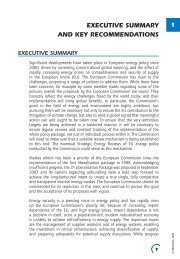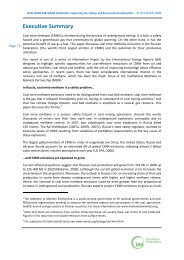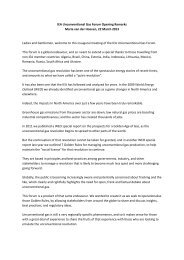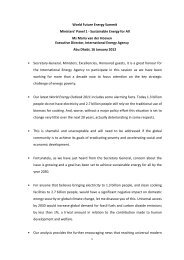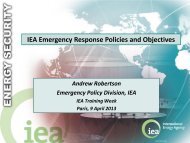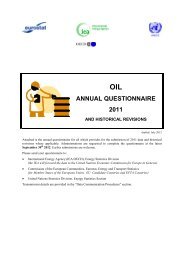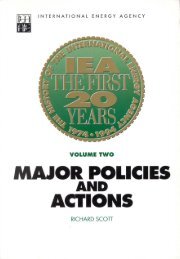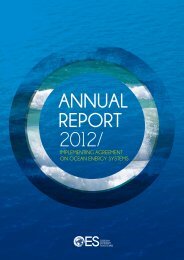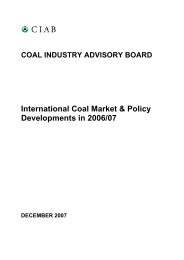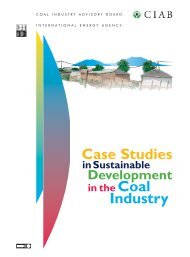Speech by Mr. Mandil in Davos... - IEA
Speech by Mr. Mandil in Davos... - IEA
Speech by Mr. Mandil in Davos... - IEA
Create successful ePaper yourself
Turn your PDF publications into a flip-book with our unique Google optimized e-Paper software.
The Key Challenges to Energy Security<br />
Energy Summit M<strong>in</strong>isterial Address<br />
World Economic Forum, <strong>Davos</strong><br />
26, January 2006<br />
Session Chair: Abdallah S. Jum’ah, President and CEO, Saudi Aramco<br />
Speakers: Claude <strong>Mandil</strong> and Edmund Daukoru (M<strong>in</strong>ister for Petroleum and Energy of<br />
Nigeria, President of OPEC)<br />
I’m delighted to share the floor today with my good friends Abdallah Jum’ah and<br />
Edmund Daukoru and would like to start <strong>by</strong> congratulat<strong>in</strong>g Dr. Daukoru on his election as<br />
President of the OPEC Conference and offer him my best wishes for the year ahead.<br />
Today I will share my thoughts on the key challenges to energy security. Or more specifically,<br />
what are the ma<strong>in</strong> threats to reliable energy supplies at affordable prices? This is an important<br />
question upon which our economies are becom<strong>in</strong>g <strong>in</strong>creas<strong>in</strong>gly dependent.<br />
Despite the recent turmoil <strong>in</strong> energy markets I believe the ma<strong>in</strong> challenges rema<strong>in</strong> the same. At<br />
the top of the list is that large consum<strong>in</strong>g countries are grow<strong>in</strong>g more and more reliant on oil and<br />
gas imports from an ever-smaller group of often distant suppliers. This trend is soberly<br />
portrayed each year <strong>in</strong> the <strong>IEA</strong>’s World Energy Outlook. Trade is to be welcomed as it b<strong>in</strong>ds<br />
suppliers and customers <strong>in</strong> mutually beneficial relationships. But, at the same time, the risk of a<br />
major supply disruption will undoubtedly <strong>in</strong>crease. Disruptions could arise from producer<br />
countries seek<strong>in</strong>g to use their market position to force up prices or <strong>by</strong> deliberately withhold<strong>in</strong>g<br />
supplies for political reasons. Or they could occur due to the exacerbated risks that wells,<br />
pipel<strong>in</strong>es or sea lanes could be blocked <strong>by</strong> terrorism, piracy, or accidents.
S<strong>in</strong>ce 1970, there have been 17 serious oil-supply disruptions. All but three of these were<br />
related to events <strong>in</strong> Middle Eastern or North African countries. We cannot turn our back on<br />
imports from any part of the world, especially this region as its vast and low cost resources are<br />
essential to meet<strong>in</strong>g our future energy needs and its producers have often stepped up to<br />
stabilize the market <strong>in</strong> times of need. We need to recognise that for most of us energy self<br />
sufficiency is an impossible and probably unnecessary goal. But we need to acknowledge the risks<br />
<strong>in</strong>volved and be prepared to deal with them. I must <strong>in</strong>sist here that this is not just about oil. It<br />
also concerns electricity and as we have seen recently, gas is not immune.<br />
But today my focus is ma<strong>in</strong>ly on oil.<br />
A key factor that will impact the severity of any future oil supply disruption is the relatively low<br />
level of spare capacity available to counteract any unpleasant surprises. Experience has shown<br />
that the sudden loss of even a modest volume of oil can lead to sharp <strong>in</strong>creases <strong>in</strong> prices if spare<br />
capacity is limited or stock levels are low.<br />
Although spare oil production capacity has been worry<strong>in</strong>gly low it is now improv<strong>in</strong>g. There are a<br />
number of upstream projects com<strong>in</strong>g to fruition that will soon boost supply. But will they do<br />
enough? Our view is that spare capacity will still fall short of the 3 mb/d comfort zone until at<br />
least 2009. International oil companies must play a role <strong>in</strong> <strong>in</strong>creas<strong>in</strong>g supply but more is also<br />
needed from produc<strong>in</strong>g countries. They have the largest and least expensive reserves on earth.<br />
There is a need to <strong>in</strong>vest, and if possible, with clear timetables and with a priority for light<br />
crudes. I take a moment to applaud OPEC’s recent decision to report upstream developments.<br />
This k<strong>in</strong>d of transparency reduces uncerta<strong>in</strong>ty from markets and is welcome.
But the problem is not only limited oil production capacity. Lack of spare oil ref<strong>in</strong><strong>in</strong>g capacity is<br />
just as troubl<strong>in</strong>g. Effective capacity is now almost fully utilised. Upgrad<strong>in</strong>g capacity is needed<br />
even more than distillation capacity as demand is shift<strong>in</strong>g to lighter products and production is<br />
becom<strong>in</strong>g heavier and more sour. In many countries environmental and plann<strong>in</strong>g regulations and<br />
public opposition are mak<strong>in</strong>g it difficult to build new ref<strong>in</strong>eries. Once aga<strong>in</strong> <strong>in</strong>vestment is needed<br />
or the market will cont<strong>in</strong>ue to experience bottlenecks and <strong>in</strong>stability and volatility will persist.<br />
Here we are encouraged to see several ref<strong>in</strong>ery projects <strong>in</strong> both produc<strong>in</strong>g and consum<strong>in</strong>g<br />
countries.<br />
Not only is the likelihood of a supply disruption set to <strong>in</strong>crease but so is its impact. This is<br />
largely due to grow<strong>in</strong>g rigidity of oil demand. Dur<strong>in</strong>g the oil shocks <strong>in</strong> the seventies and early<br />
eighties much oil was still be<strong>in</strong>g used for power generation or <strong>in</strong> <strong>in</strong>dustrial applications and much<br />
could be substituted <strong>by</strong> natural gas or coal. This is no longer the case. Oil is <strong>in</strong>creas<strong>in</strong>gly<br />
concentrated <strong>in</strong> transport and exist<strong>in</strong>g vehicles simply cannot switch fuels dur<strong>in</strong>g a supply crisis.<br />
Even with the most prudent of energy policies <strong>in</strong> place oil supply disruptions may still occur. This<br />
pragmatism was the driv<strong>in</strong>g force beh<strong>in</strong>d the creation of the <strong>IEA</strong> soon after the first oil shock.<br />
S<strong>in</strong>ce then the world and oil markets have changed dramatically. We have steadily built up oil<br />
stocks and developed a sophisticated set of emergency response measures. These proved their<br />
effectiveness <strong>in</strong> the later part of 2005 after the two hurricanes knocked-out much of the<br />
production and ref<strong>in</strong><strong>in</strong>g capacity <strong>in</strong> the Gulf of Mexico. In the decades ahead, as the world<br />
confronts ris<strong>in</strong>g oil-import dependence, we will have to <strong>in</strong>crease our preparedness, and f<strong>in</strong>d ways<br />
to work with other large consum<strong>in</strong>g nations like Ch<strong>in</strong>a and India. This will be costly but also<br />
essential if an appropriate level of emergency security is to be ma<strong>in</strong>ta<strong>in</strong>ed.
As recent events have highlighted, it is not just <strong>in</strong>creas<strong>in</strong>g reliance on oil imports that pose<br />
challenges to energy security. Russia’s decision to turn off gas supplies to Ukra<strong>in</strong>e sent shivers<br />
far beyond Kiev. By these actions Russia put its reputation as a reliable energy supplier <strong>in</strong><br />
question and raised doubts about how Europe would deal with a more prolonged disruption.<br />
Over half of European gas imports come from Russia. This <strong>in</strong> itself is not a concern. After all,<br />
the two are natural energy partners. The concern is that all of the natural gas exported from<br />
Russia comes from or through Gazprom. For several years now the <strong>IEA</strong> has doubted whether<br />
this state gas monopoly is mak<strong>in</strong>g sufficient <strong>in</strong>vestment to meet ris<strong>in</strong>g export demand. We have<br />
also been troubled <strong>by</strong> its expansion strategy which has delivered it control of much of the<br />
supply cha<strong>in</strong> from the wellhead to the consumer thus deny<strong>in</strong>g competitors from export<strong>in</strong>g<br />
Russian gas.<br />
Now that Gazprom has demonstrated its will<strong>in</strong>gness to exploit this market power it makes sense<br />
for European countries to re-exam<strong>in</strong>e the nature of their exposure to this risk and the options<br />
for mitigat<strong>in</strong>g it. Europe should start look<strong>in</strong>g to other suppliers or to other fuels unless market<br />
reforms allow Russian oil companies – with their <strong>in</strong>creas<strong>in</strong>g associated gas production - and<br />
Russian <strong>in</strong>dependent gas producers to compete <strong>in</strong> its lucrative market. Europe could also reevaluate<br />
its fuel mix for power generation. Coal and nuclear both require another look and<br />
renewables are a cont<strong>in</strong>u<strong>in</strong>g option. Development of emergency gas stockpiles has also been<br />
suggested as a way of mitigat<strong>in</strong>g the risks. These could well be part of the solution but would be<br />
up to 10 times more expensive than oil stocks on a comparable basis and, until the flexibility of<br />
distribution system is improved, much less effective.
I have been focus<strong>in</strong>g on threats to energy security posed <strong>by</strong> energy imports but let us not<br />
ignore those closer to home. Energy market liberalisation should re<strong>in</strong>force energy security <strong>by</strong><br />
promot<strong>in</strong>g efficiency and <strong>in</strong>creas<strong>in</strong>g the diversity of supply. But is this always the case? The<br />
major blackouts that struck North America and Europe dur<strong>in</strong>g 2003 and 2004 raised some valid<br />
questions. While large blackouts are <strong>by</strong> no means a new phenomenon and happened well before<br />
electricity reform, these disruptions underscored the need for liberalized markets to offer<br />
<strong>in</strong>vestors sufficient <strong>in</strong>centives to provide customers with a sufficient degree of security.<br />
In clos<strong>in</strong>g I would like to reiterate the central role governments must play <strong>in</strong> ensur<strong>in</strong>g the<br />
security of all energy forms. Firstly, they must create an <strong>in</strong>vestment environment where the<br />
private sector is able to accomplish its task of provid<strong>in</strong>g secure, affordable, clean energy whilst<br />
mak<strong>in</strong>g a decent return. Governments will have to look at new ways of diversify<strong>in</strong>g their fuels, as<br />
well as the geographic sources of those fuels. They need to exercise leadership <strong>in</strong> deal<strong>in</strong>g with<br />
the energy-security risks <strong>in</strong>herent <strong>in</strong> energy trade. Strategic oil stocks are a key safety net but<br />
relations with energy suppliers will also have to be strengthened. F<strong>in</strong>ally, the most secure energy<br />
is clearly that which we do not consume. Governments must therefore cont<strong>in</strong>ue to peruse<br />
stronger demand-side policies to reduce energy use through conservation and improved<br />
efficiency.<br />
Thank you.





